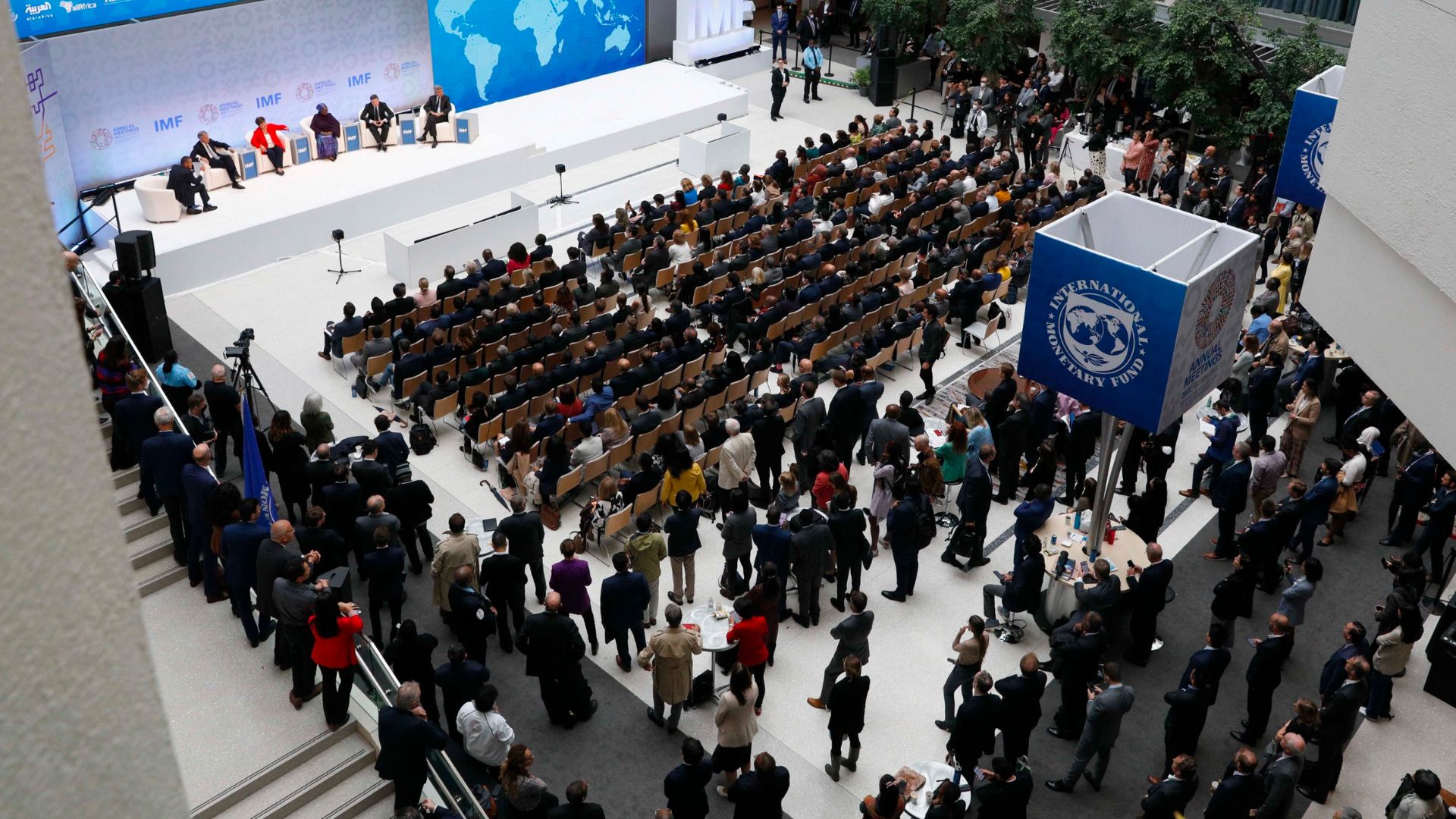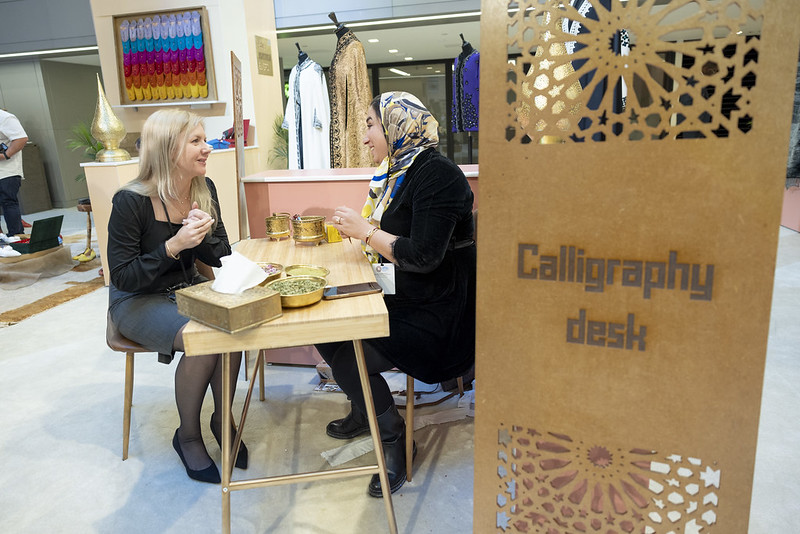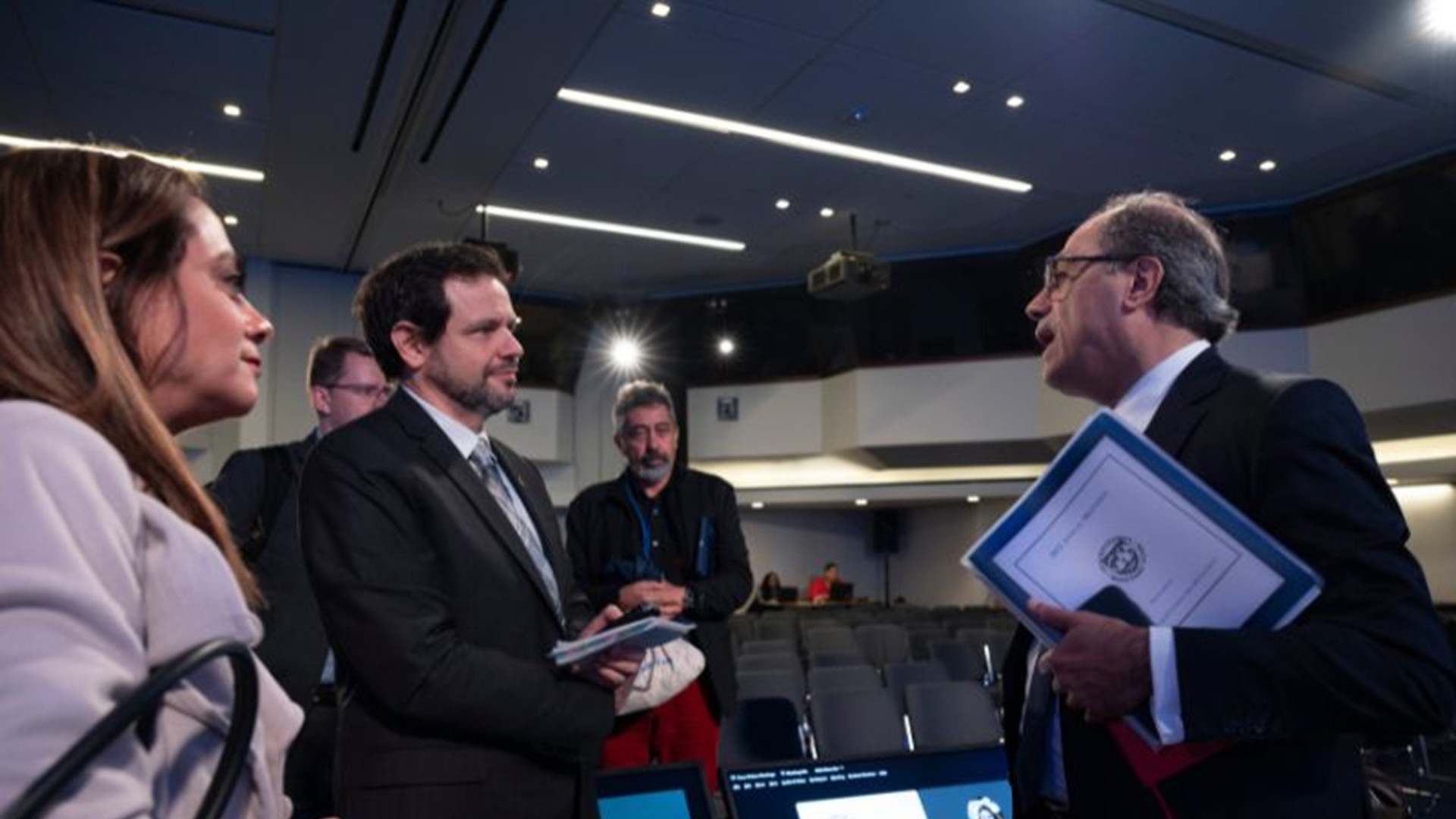
IMF ANNUAL Meetings Update | OCTOBER 13, 2022
In our recap for Thursday, October 13, we focus on the Global Policy Agenda, a high-level debate on the global economy, and the economic outlook for the Middle East and Central Asia and the Western Hemisphere.

Global Policy Agenda: Act Now, Act Together
“The world economy has been hit by one shock after another—Covid, Russia’s invasion of Ukraine, and climate disasters on every continent,” said IMF Managing Director Kristalina Georgieva at her press conference on the Global Policy Agenda. “They continue to harm people’s lives, and they have caused a cost-of-living crisis.” In her remarks, Georgieva said that this week provides an opportunity to work towards minimizing the risk of policy missteps. Appealing for policymakers to act with a sense of urgency now and to act together, she emphasized the need to bring down inflation, ensure responsible fiscal policies, and safeguard financial stability. Debt, food insecurity, climate change, digitalization, and inequality must also be addressed urgently.

Global Economy Debate: Growth Pressures
Rises in international interest rates will add to global growth pressures and the challenges facing policymakers, panelists said during a debate on the global economy. “The number one priority is to win the fight against inflation," the IMF’s managing director Kristalina Georgieva told the debate, moderated by CNN’s Richard Quest. Monetary and fiscal policy must work together, at the national and international levels, so as not to make matter worse, said Cambridge University’s Mohamed El-Erian. “Unfortunately, policymakers have amplified volatility.” Mark Carney, the UN’s special envoy for climate action and a former governor of the Bank of England, underscored the importance of strong institutions and credible policies at a time of persistent inflation.“Mistakes will be punished,” he said. Emerging market and developing economies are under particular stress as global interest rates rise.
Quote of the Day

The reason why we are endorsing a strong focus on inflation is because inflation has been quite stubborn and the risk of inflation expectations de-anchoring has become more visible. We cannot possibly allow inflation to become a runaway train, it's bad for growth and bad for people.
KRISTALINA GEORGIEVA, MANAGING DIRECTOR, IMF

Governor Talks: Singapore - Financing the Green Transition
The physical risks of climate change as well as the risks associated with the transition to net zero will both significantly affect the financial system, and every financial institution ought to have a transition plan, the Singapore Monetary Authority’s Managing Director Ravi Menon told a Governor Talk. Governments are showing greater awareness of the power of finance to accelerate the transition, he said. The focus now must be on action today. “Making a commitment for 2050 is great, but it’s not going to stop emissions now.” If the world proceeds on the current trajectory, climate will pass a tipping point by 2030 or 2035.

Middle East, Central Asia Face Slower Growth
The Middle East and Central Asia is being hit by a confluence of shocks—global slowdowns, high food and energy prices, and faster and stronger tightening of global financial conditions, the IMF’s Jihad Azour told a press conference. The IMF expects the Middle East and North Africa region to grow by 5% this year. However, worsening global conditions will weigh on the outlook next year, with growth slowing to 3.6%. For the Caucuses and Central Asia, growth is expected to slow to 3.5% over the medium term, which is significantly lower than the region’s historical average of almost 7%.

Latin America: Inflation to Persist
Latin American and Caribbean economies are expected to grow by 3.5% this year but will slow down to 1.7% in 2023 as major central banks around the world raise interest rates, resulting in less capital inflows to the region and an increase in external borrowing costs, explained the director of the IMF’s Western Hemisphere Department Ilan Goldfajn. Commodity exporters—South American countries and some Caribbean economies—will see their growth rates halved next year, as lower commodity prices amplify the impact of rising interest rates. Price increases for Latin America and the Caribbean (excluding Venezuela) will reach around 14.5% by the end of this year and remain high, at about 9.5%, by end-2023.
Number of the Day
93
countries
Since the pandemic began, the IMF has provided financial support to 93 countries for a total of around $260 billion.
Learn more
BEHIND-THE-SCENES

A henna artist prepares to decorate the hands of an attendee at the Marrakech Pavilion.

The Afro Floetry Band performs at the Kenya Cultural Event in the atrium of the IMF headquarters.

Jihad Azour, Director of the Middle East and Central Asia Department, talks to THE press after the PRESS CONFERENCE.
Upcoming Events

New Economy Forum: Lowering the Remittances Cost and Mitigating Illicit Financial Flows
The presentation will focus on a solution outlined in the Fund-staff developed “Framework for AML/CFT Risk Assessment of a Payment Corridor”.
Event Details
New Economy Forum: Beyond CBDC - Fast Payments as a Competitor or Model?
Tommaso Mancini-Griffoli, Division Chief of the Payments, Currencies, and Infrastructure division, discusses different views on CBDCs
Event Details
IMF Seminar: CBDCs for Financial Inclusion: Risks and Rewards
The session will share knowledge and lessons learned thus far. The seminar will feature opening remarks by Her Majesty Queen Máxima of the Netherlands.
Event Details


